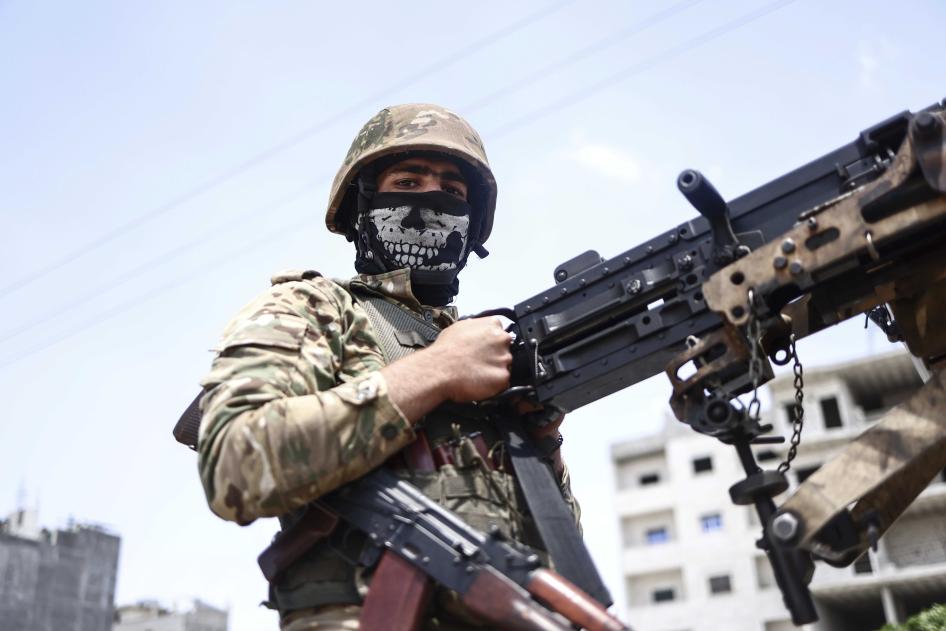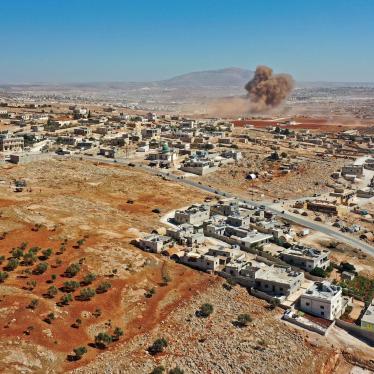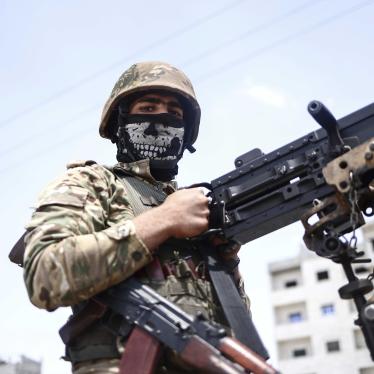(Beirut) – Turkish airstrikes since November 20, 2022, are inflicting damage on densely populated areas and critical infrastructure across north and northeast Syria and exacerbating an already catastrophic humanitarian crisis for Kurds, Arabs, and other communities in the region, Human Rights Watch said today.
The strikes have displaced families, caused significant power cuts and fuel shortages, forced aid organizations to temporarily suspend certain activities, and led to school and work disruptions, international humanitarian workers and local residents told Human Rights Watch. The NES NGO forum, the lead coordination body for nongovernmental organizations working in northeast Syria, warned in a November 25 statement of the harm that targeting energy infrastructure could have on the environment and on the current water crisis in the region.
“Turkey’s attacks on populated areas and critical infrastructure across north and northeast Syria is putting civilians’ basic rights further at risk,” said Adam Coogle, deputy Middle East director at Human Rights Watch. “Syrians are already enduring a humanitarian catastrophe, a growing displacement crisis, and an economy in free fall. Turkey’s military strikes risk making an already unbearable situation much worse for Kurds, Arabs, and other communities.”
Human Rights Watch spoke to six residents living in the cities of Kobani (Ayn al-Arab), Qamishli, Derik, and the town of Cil Axa (Al-Jawadiyah) in al-Hasakeh governorate, all of which suffered damages, as well as international humanitarian workers including two on the ground in northeast Syria.
The NES NGO forum stated that at least 10 civilians are reported to have died in Turkey’s airstrikes. They include a journalist killed while interviewing residents of Derik (al-Malikiyah in Arabic), a city in northeast Syria’s al-Hasakeh governorate. The area he was reporting from had been the target of a separate airstrike in the same location just hours before, the Committee to Protect Journalists reported.
Turkish President Recep Tayyip Erdoğan has said the aerial attacks on northeast Syria are in retaliation for a November 13 bombing in Istanbul that killed six civilians and injured dozens, for which Turkey has blamed the Kurdistan Workers’ Party (PKK) and the People's Protection Units (YPG). Turkey, the United States, and the European Union deem the PKK a terrorist group. Ankara considers the YPG, the largest member of the Syrian Democratic Forces, a United States-backed, Kurdish-led armed group that controls much of northeast Syria, an extension of the PKK.
The PKK and the Syrian Democratic Forces, the main ground force fighting ISIS in northeast Syria, have both denied involvement in the Istanbul bombing. For the third time in 2022, Erdoğan is also threatening a ground invasion into regions controlled by the SDF. This would be Turkey’s fourth incursion into northern Syria since 2016. Previous incursions have been fraught with human rights abuses.
On the eve of November 20, the Turkish air force began an offensive into northern Syria, calling it Operation Claw-Sword, which Turkey says is targeting Syrian Democratic Forces and Syrian Armed Forces positions but which also struck a Covid-19 treatment center, a school, grain silos, power plants, gas stations, oil fields, and a road frequently used by civilians and aid groups. Turkey also launched airstrikes in northern Iraq, which it said were targeting PKK positions.
The aerial bombardment started mere days after Turkey and 81 other countries adopted a political declaration that seeks to better protect civilians worldwide from the use of explosive weapons in populated areas.
A woman who lives in Qamishli told Human Rights Watch that the city was heavily bombarded between November 22 and 24. “Some strikes were landing as close as one kilometer from my workplace and two kilometers from my home,” she said. A man living with his wife and 11-year-old son in a forested area at the eastern edge of Kobani city said Turkish forces shelled the area, partially damaging his house and forcing his family and four other families to leave their homes. “It’s been 10 days since I left my house and I don’t know when I will be returning,” he said on November 30.
The damage to energy infrastructure has disrupted essential services across northeast Syria. An attack near the Swedieh power plant in the district of Derik on November 23 led to significant power and internet cuts in Derik city and Derik and al-Hasakeh sub-districts, residents and aid workers told Human Rights Watch.
The NES NGO Forum said that the power plant feeds electricity to Allouk water station, which serves more than 460,000 people in al-Hasakeh governorate, and all highly populated areas and cities in the upper Jazira region. “Some families are still without internet or power,” one aid worker in northeast Syria told Human Rights Watch on November 30, adding that the most significant power cuts occurred between November 23 and 29.
“Before the airstrikes, we used to get some five hours of electricity,” said the woman who lives in Qamishli. “Now we don’t get it at all.”
Targeting oil and gas facilities has also exacerbated the severe fuel shortages that have already afflicted northeast Syria, leaving civilians struggling to find cooking and heating fuel for the winter. “It’s hard for us to get gas cylinders these days, even on the black market,” said one resident of Qamishli.
“The fuel prices had already risen to unbelievable, unaffordable levels,” another Qamishli resident said. “But at least before the strikes, fuel was still available.”
All six residents interviewed said that their lives have been drastically disrupted since Turkey began Operation Claw Sword. “So much has changed since the beginning of this offensive,” said a resident of Cil Axa (Juwaidiya) who owns chicken coops, one of which he said was badly damaged in a Turkish strike on a nearby oil field. “We don’t dare go out anymore, not even to our jobs. We don’t know when or how a strike is going to happen.”
“People are living in fear,” said a man who lives with his family near the city of Kobani. “There is a general sense of panic and terror. People are not going to work, children are not going to school.” His own daughters, ages 5 and 7, have gone to school just 1 day since November 20, he said. “They ran home crying when they heard blasts near their school that day.”
On November 23, Turkish strikes also targeted an SDF post at al-Hol camp, a detention camp in al-Hasakeh governorate that holds more than 53,000 Islamic State (ISIS) suspects and family members, most of them women and children from about 60 countries. The strikes killed eight guards, and caused panic among detainees and aid groups, the SDF and the Syrian Observatory for Human Rights said. Three aid workers said that the ongoing escalations have forced aid groups to intermittently suspend or reduce some services in al-Hol and surrounding areas.
Strikes in the area that includes Roj camp, outside of Derik, knocked out power for nearly two days, severely reduced water supplies, and caused shortages of fresh food in the camp market, four women held there told Human Rights Watch.
Turkey has repeatedly subjected northeast Syrian cities and towns controlled by the SDF to shelling, artillery and drone attacks in 2022. In August, in response to escalating threats of a Turkish ground invasion into the region, Human Rights Watch issued a question-and-answer document highlighting the widespread abuses committed by Turkey and Turkish-supported local armed groups during its previous incursions into the region,
Human Rights Watch also addressed the implications for Syrians and foreigners detained in the region for alleged links to ISIS in its document. It outlined the international legal obligations on all parties to the conflict to take all feasible measures to protect civilians and minimize damage to civilian infrastructure. If there is an invasion, Turkey should open its borders to those in need and allow those fleeing the conflict to seek protection inside Turkey, Human Rights Watch said.
“Turkey can, and should, ensure that its military actions do not further aggravate northeast Syria’s humanitarian and displacement crises,” Coogle said. “Turkey’s international allies should press the government to ensure that its campaign does not put Syrians’ basic rights at risk.”









